Marshmallows, those pillowy clouds of sweetness that elevate our favorite desserts, have intrigued many with a lingering question: do they contain pork?
The key lies in an ingredient called gelatin, derived from animal collagen, which gives marshmallows their signature texture.
In this exploration, we’ll uncover the truth about marshmallows, specifically addressing the presence of pork-derived elements. For those seeking alternatives, we’ve delved into a range of pork-free brands, ensuring there’s a marshmallow for every dietary preference.
Join us on this succinct yet insightful journey through the world of marshmallows, and find the perfect option for your unique taste and values.
Table of Contents
What is Gelatin and Why is it Used in Marshmallows?
Gelatin is a protein derived from animal collagen, typically sourced from the skin, bones, and connective tissues of animals like pigs or cows. It is a versatile ingredient known for its unique gelling properties.
When mixed with water and heated, gelatin forms a semi-solid, jelly-like substance. This property is crucial in marshmallow production as it gives the treat its characteristic soft and fluffy texture.
In marshmallows, gelatin acts as a stabilizing agent, providing the structure that allows them to hold their shape while maintaining a delightful, airy consistency.
Without gelatin, marshmallows would lack their iconic texture, making it an indispensable component of traditional marshmallow recipes.
However, due to its animal-derived nature, gelatin has led to debates about whether marshmallows can be considered vegetarian or vegan.
This concern has driven the development of alternative, plant-based substitutes like agar-agar, which offers a comparable gelling effect and is suitable for those following vegetarian or vegan diets.
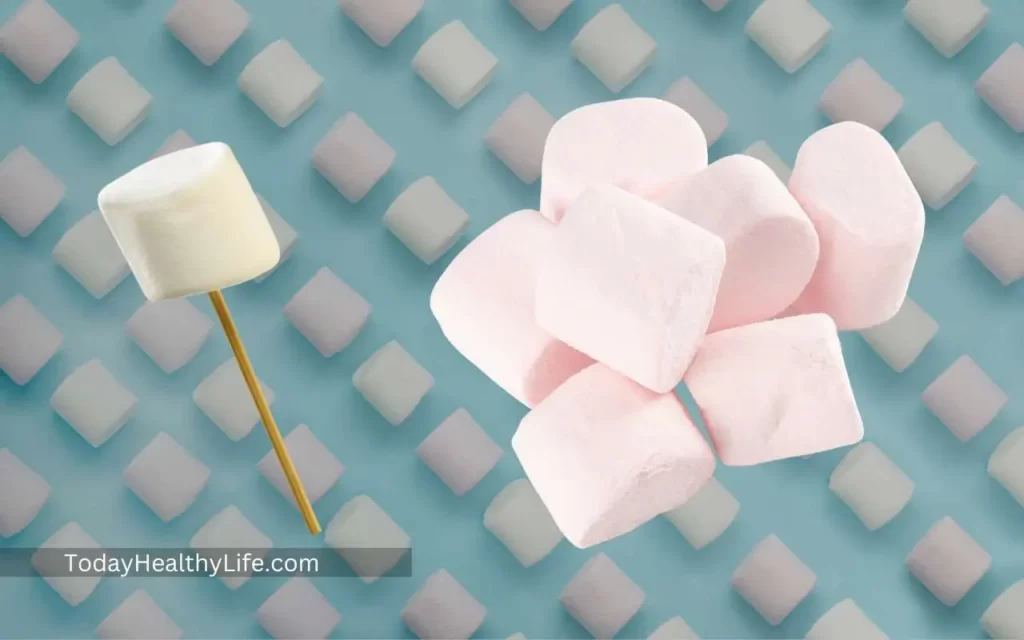
Do Marshmallows Have Pork?
No, not all marshmallows contain pork. Some brands offer pork-free marshmallows made with beef or fish gelatin, or with plant-based gelatin alternatives.
This diversity in ingredients arises from the increasing demand for marshmallow products that cater to various dietary preferences and restrictions.
Beef or Fish Gelatin as Alternatives
In response to the dietary concerns of consumers, many manufacturers have started to use gelatin derived from sources other than pork. Beef gelatin, which comes from the collagen of cows, is a common alternative.
Similarly, fish gelatin, sourced from fish skin and bones, provides a suitable substitute for those who prefer to avoid pork-based products.
Plant-Based Gelatin Alternatives
For individuals following vegetarian or vegan diets, plant-based gelatin alternatives have become a popular choice. Agar-agar, derived from seaweed, is one such option.
It offers a comparable gelling effect to traditional animal-derived gelatin, ensuring that even those with strict dietary restrictions can enjoy marshmallows without compromising their values.
Labeling and Certification
To provide clarity to consumers, many marshmallow brands now explicitly state the source of the gelatin used in their products on the packaging.
This labeling practice allows individuals to make informed choices based on their dietary preferences and restrictions.
Cross-Contamination Concerns
While some marshmallow brands use alternative gelatin sources, it’s important to note that cross-contamination can still occur during the manufacturing process.
This is particularly relevant for individuals following halal or kosher diets, who may require stricter adherence to dietary guidelines.
Therefore, seeking out products with appropriate certifications can help ensure that dietary requirements are met.
While traditional marshmallows have historically used gelatin derived from animals, particularly pork, the evolving demands of consumers have prompted the development of various alternatives. Whether sourced from beef, fish, or plants, these alternatives cater to a wide range of dietary preferences, allowing individuals to enjoy marshmallows without compromising their values or beliefs. With clear labeling practices and certifications, consumers can make informed choices that align with their specific dietary needs.
Read: Does Pop Tarts Have Pork?
Marshmallow Ingredients
Marshmallows, those fluffy confections beloved for their melt-in-the-mouth goodness, are crafted from a handful of simple yet crucial ingredients.
Here’s a breakdown of the core components that come together to create these delightful treats:
- Sugar: The primary ingredient in marshmallows is sugar. It provides the sweetness and forms the foundation of the confection.
- Water: Water is essential for dissolving the sugar and creating the syrup that forms the base of the marshmallow mixture.
- Gelatin: Gelatin is a key ingredient that gives marshmallows their characteristic texture. It is derived from animal collagen and provides the structure that allows marshmallows to hold their shape.
- Corn Syrup or Cornstarch (Optional): Corn syrup or cornstarch is often added to the mixture to help prevent crystallization of the sugar, resulting in a smoother texture.
- Flavorings: Vanilla extract is a common flavoring used in marshmallows. It adds a pleasant aroma and taste to the confection.
- Optional Add-Ins: Depending on the desired flavor profile, additional ingredients like cocoa powder, fruit extracts, or food coloring can be incorporated.
- Powdered Sugar or Cornstarch (for Coating): To prevent marshmallows from sticking together, they are typically coated with powdered sugar or cornstarch after setting.
It’s important to note that while traditional marshmallows use gelatin sourced from animals, particularly pork or beef, there are now alternative options available for those with dietary restrictions or preferences. Plant-based substitutes like agar-agar provide a gelatin-like texture, allowing for the creation of vegetarian and vegan-friendly marshmallows. Additionally, some brands offer marshmallows made with kosher or halal gelatin, ensuring they meet specific dietary guidelines.
Read: Do Marshmallows Have Dairy?
How to Find Pork-Free Marshmallows
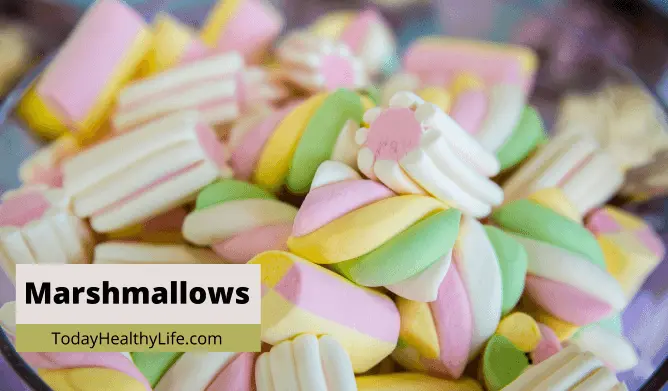
For individuals with dietary restrictions or personal preferences that exclude pork, finding pork-free marshmallows is essential.
Here are some tips to help you locate marshmallow products that align with your dietary needs:
1. Read Ingredient Labels
The first and most crucial step in finding pork-free marshmallows is to carefully read the ingredient labels. Look for marshmallow brands that explicitly state the source of their gelatin.
Brands using alternative gelatin sources like beef, fish, or plant-based options will often highlight this on their packaging.
2. Look for Kosher or Halal Certification
Products that carry a kosher or halal certification are guaranteed to meet specific dietary guidelines, including the absence of pork-derived ingredients.
These certifications provide assurance to individuals with strict dietary requirements that the marshmallows are pork-free.
3. Seek Vegan or Vegetarian Marshmallows
Vegan and vegetarian marshmallows are typically made without any animal-derived ingredients, including gelatin. Instead, they use plant-based alternatives like agar-agar.
Look for products labeled as “vegan marshmallows” or “gelatin-free marshmallows” to ensure they are free from pork.
4. Research Brands and Manufacturers
Some brands specialize in producing marshmallows that cater to specific dietary preferences.
Conducting a quick online search or checking the brand’s website can provide valuable information about their ingredients and sourcing practices.
5. Shop at Specialty Stores or Online Retailers
Specialty stores and online retailers that focus on dietary-specific products often carry a wide range of marshmallow options.
They may offer a selection of pork-free marshmallows, including those made with alternative gelatin sources.
6. Contact Manufacturers for Clarification
If you’re unsure about a specific product, don’t hesitate to reach out to the manufacturer directly.
They can provide detailed information about their ingredients and sourcing practices, ensuring you make an informed decision.
7. Join Online Communities and Forums
Online communities and forums dedicated to dietary restrictions or specific lifestyles can be excellent resources for finding recommendations and reviews of pork-free marshmallow brands.
Members often share their experiences and insights, helping you discover new products.
With a little diligence and awareness, it’s entirely possible to find delicious, pork-free marshmallows that suit your dietary needs. By following these tips and exploring various brands and options, you can enjoy this beloved treat without compromising your values or dietary preferences.
Read: Is Pork Fat Bad For Your Heart?
Popular Pork-Free Marshmallow Brands
If you’re in search of delicious marshmallows without pork-derived ingredients, there are several trusted brands that offer a variety of options to cater to different dietary preferences.
Here are some popular pork-free marshmallow brands known for their quality and commitment to providing alternatives:
1. Dandies
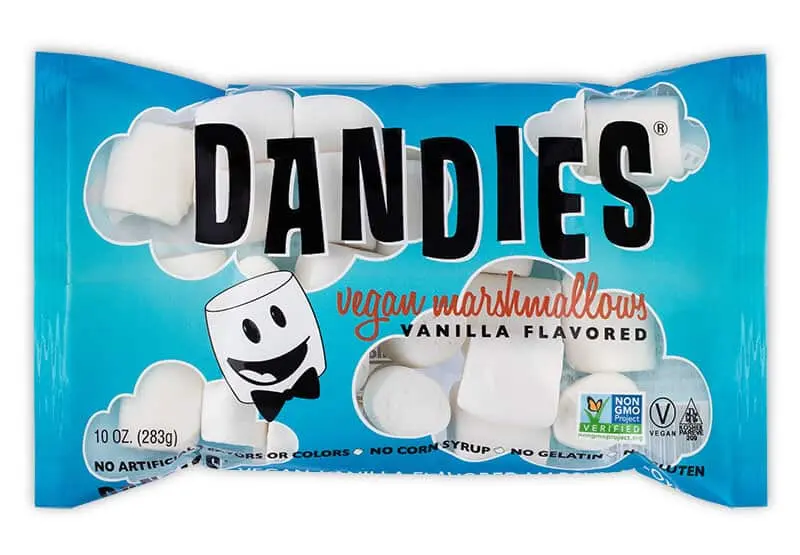
Dandies is a well-known brand in the world of marshmallows, specializing in vegan and gelatin-free varieties.
Their marshmallows are made with all-natural ingredients and are free from common allergens. Dandies offers a range of flavors and sizes, making them a versatile choice for various recipes.
2. Smashmallow
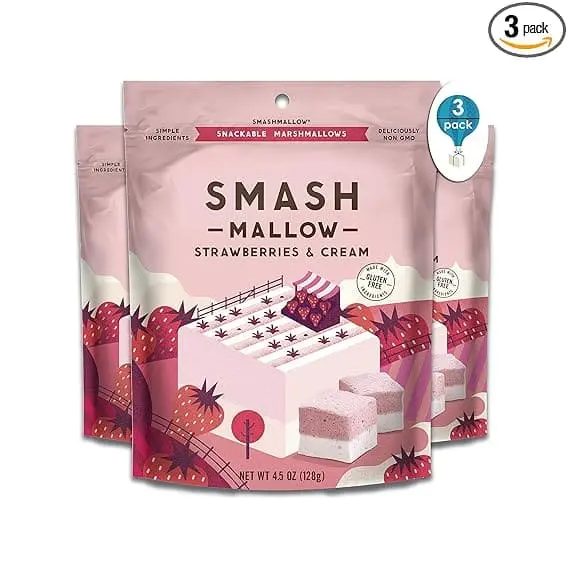
Smashmallow is a brand that offers a unique twist on traditional marshmallows. They provide gourmet marshmallows in a variety of flavors, all of which are free from pork-derived gelatin.
Smashmallow marshmallows are also gluten-free and made with non-GMO ingredients.
3. Sweet & Sara
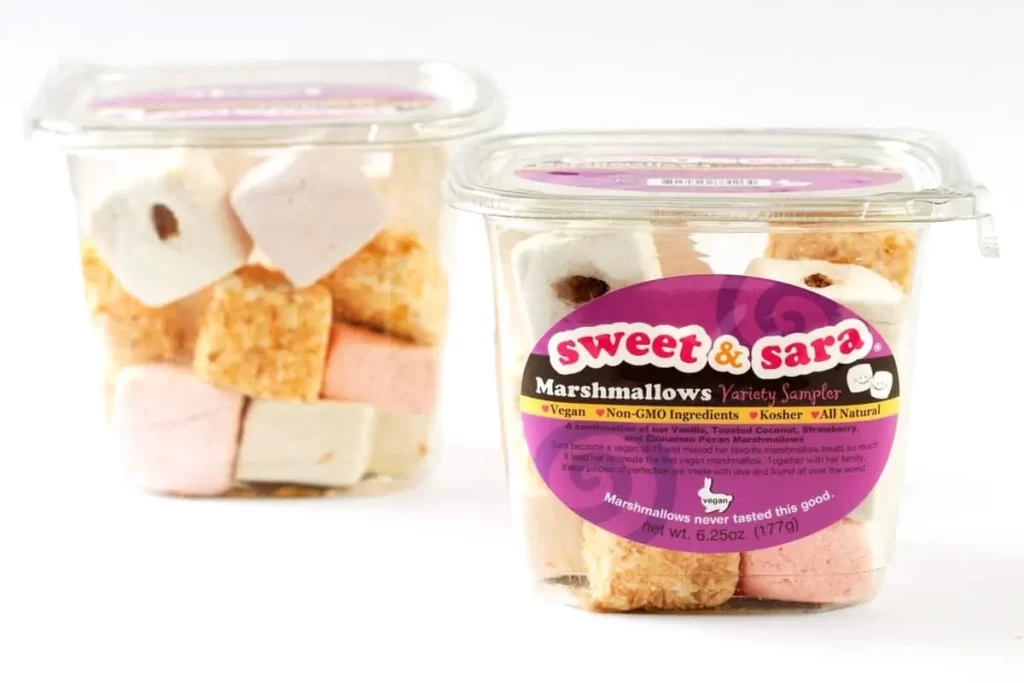
Sweet & Sara is another reputable brand known for its vegan marshmallow products. They offer an array of flavors, including classic vanilla, chocolate-covered, and seasonal varieties.
Sweet & Sara marshmallows are made with simple, natural ingredients, making them a favorite among those seeking pork-free options.
4. Freedom Confectionery
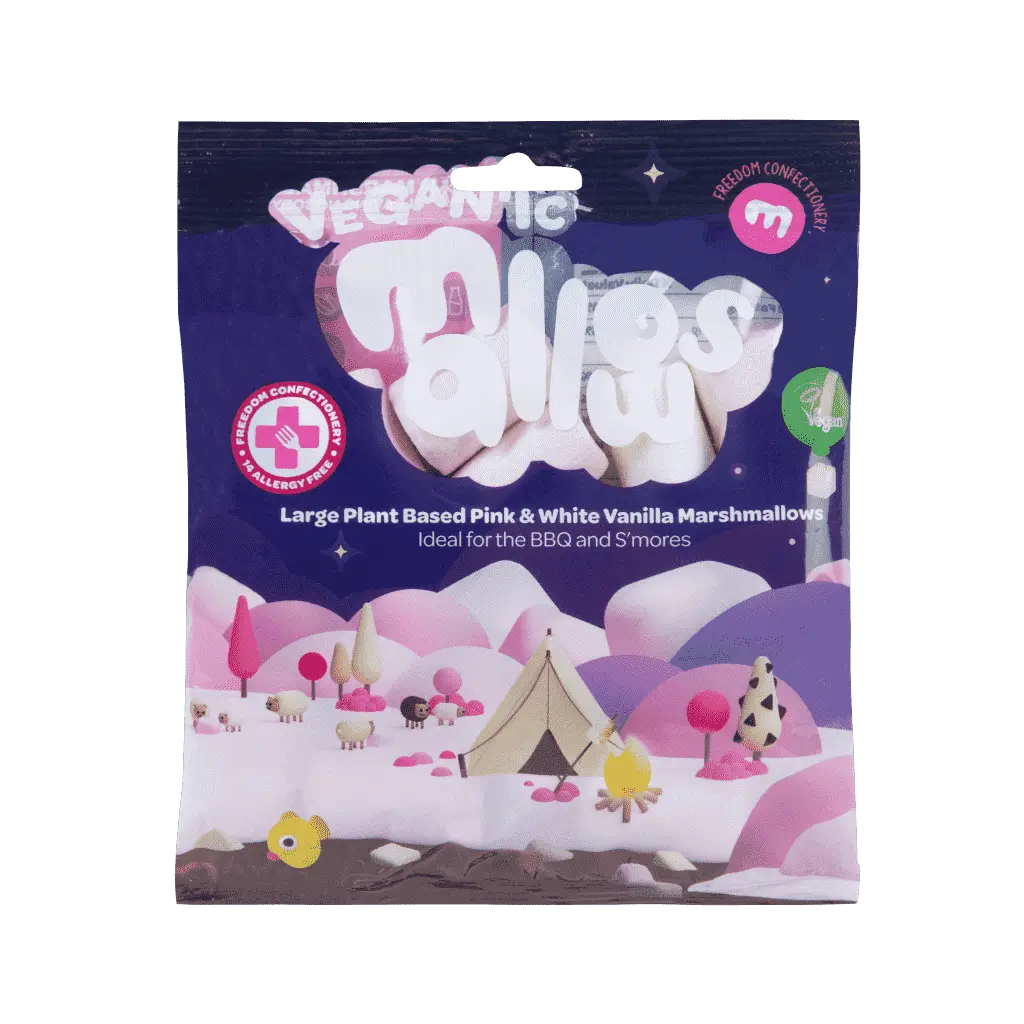
Freedom Confectionery specializes in allergen-free marshmallows, including vegan and halal-certified varieties.
Their marshmallows are made with natural colors and flavors, catering to a wide range of dietary needs and preferences.
5. Ananda’s Marshmallows
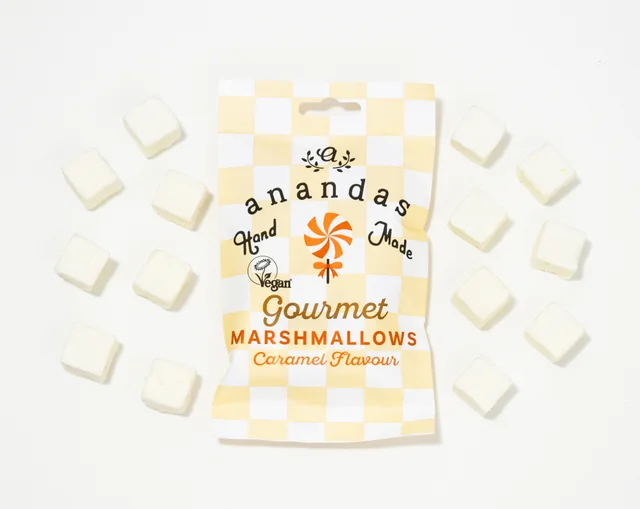
Ananda’s is a UK-based brand that produces handcrafted, vegetarian marshmallows. They offer a selection of flavors, including traditional vanilla and more unique options like raspberry.
Ananda’s marshmallows are gelatin-free and suitable for vegetarians.
6. Trader Joe’s
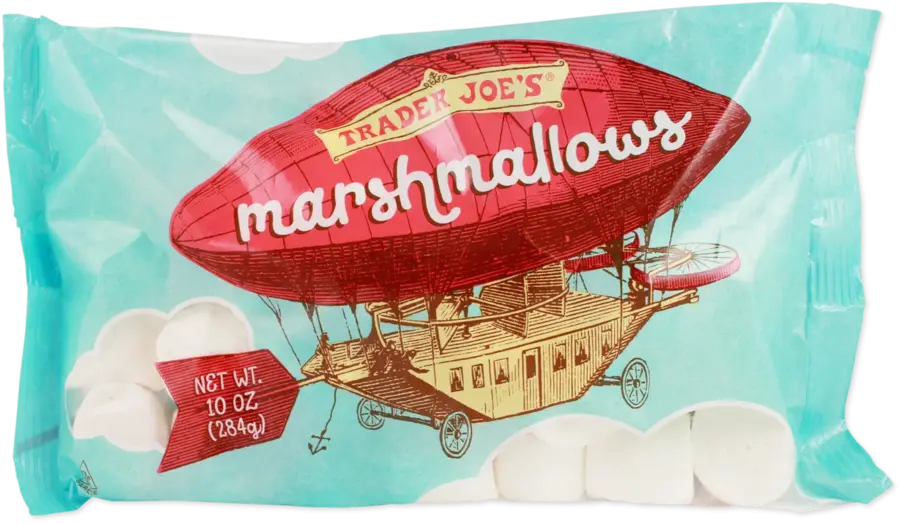
Trader Joe’s, a popular grocery store chain, offers its own brand of marshmallows that are free from pork-derived gelatin.
These marshmallows are made with kosher fish gelatin, providing a suitable alternative for individuals looking for pork-free options.
Remember to always check the product labels for the most up-to-date information on ingredients and certifications to ensure they meet your specific dietary requirements. These brands offer a variety of delicious marshmallow options, ensuring that everyone can enjoy this classic treat, regardless of their dietary preferences.
How to Make Pork-Free Marshmallows at Home
Making pork-free marshmallows from scratch can be a fun and rewarding kitchen project. Here’s a step-by-step guide to creating these fluffy delights without using any pork-derived ingredients:
Ingredients You’ll Need:
- 3 tablespoons agar-agar powder (a plant-based gelatin substitute)
- 1 cup water (for dissolving agar-agar)
- 1 1/2 cups granulated sugar
- 1 cup water (for the sugar syrup)
- 1 teaspoon vanilla extract
- 1/4 teaspoon salt
- 1 cup powdered sugar (for dusting)
- Cornstarch (for dusting)
Equipment Needed:
- Candy thermometer
- Stand mixer with whisk attachment (or hand mixer)
- Saucepan
- Baking dish (for setting the marshmallows)
- Offset spatula or spoon (for spreading the mixture)
Instructions:
- Prepare the Pan:
- Grease a baking dish and dust it with a mixture of powdered sugar and cornstarch. This will prevent the marshmallow mixture from sticking.
- Dissolve Agar-Agar:
- In a small bowl, mix the agar-agar powder with 1 cup of water. Allow it to sit for about 5 minutes to dissolve.
- Create the Sugar Syrup:
- In a saucepan, combine the granulated sugar and 1 cup of water. Heat over medium-high heat, stirring until the sugar is completely dissolved. Attach a candy thermometer to the side of the saucepan.
- Boil and Simmer:
- Bring the sugar syrup to a boil. Once it reaches a boil, reduce the heat to a simmer and let it cook without stirring until it reaches 240°F (115°C) on the candy thermometer. This is known as the “soft ball stage.”
- Combine Agar Mixture and Sugar Syrup:
- Slowly pour the agar-agar mixture into the simmering sugar syrup while whisking continuously. Be careful, as the mixture will be very hot.
- Whip the Mixture:
- Transfer the mixture to the bowl of a stand mixer fitted with a whisk attachment (or use a hand mixer). Whip on high speed for about 10-12 minutes or until the mixture becomes thick, glossy, and holds its shape.
- Add Flavor and Salt:
- Add the vanilla extract and salt, and continue to whip for an additional minute to incorporate the flavors.
- Transfer and Set:
- Quickly transfer the marshmallow mixture to the prepared baking dish. Use an offset spatula or spoon to smooth the top.
- Allow to Set:
- Let the marshmallows sit at room temperature for at least 4 hours or overnight to set.
- Cut and Coat:
- Dust a cutting board with the powdered sugar and cornstarch mixture. Turn the marshmallow slab out onto the board and cut it into squares or desired shapes. Coat each piece in the powdered sugar mixture to prevent sticking.
- Store:
- Store the pork-free marshmallows in an airtight container at room temperature for up to two weeks.
Enjoy Your Homemade Pork-Free Marshmallows!
Now that you’ve created your own batch of delicious pork-free marshmallows, you can use them in your favorite recipes or simply enjoy them on their own.
Experiment with different flavors and shapes to make them uniquely yours!
Risks of Eating Pork Gelatin Marshmallows
Consuming marshmallows made with pork gelatin may pose certain risks for individuals with specific dietary restrictions, beliefs, or health concerns.
Here are some potential risks associated with consuming marshmallows containing pork gelatin:
1. Dietary Restrictions:
- Religious Restrictions: For individuals following certain religious dietary laws, such as those in Islam or Judaism, consuming pork is strictly prohibited. Marshmallows made with pork gelatin would not be permissible under these dietary guidelines.
2. Allergies and Sensitivities:
- Pork Allergy: Some individuals may have an allergy to pork proteins. Consuming marshmallows made with pork gelatin could lead to allergic reactions, ranging from mild symptoms like hives or digestive discomfort to more severe reactions such as anaphylaxis.
3. Ethical and Cultural Beliefs:
- Vegetarian and Vegan Diets: People who adhere to vegetarian or vegan diets do not consume animal products, including gelatin sourced from animals. Marshmallows made with pork gelatin would not align with their dietary beliefs and preferences.
4. Health Concerns:
- Religious and Cultural Health Considerations: Some individuals follow dietary guidelines based on their cultural or religious beliefs for health reasons. For example, individuals who follow kosher or halal diets may choose to avoid pork for health considerations.
5. Cross-Contamination Risks:
- Strict Dietary Requirements: Even if a marshmallow product claims to be made with pork gelatin, there is a potential risk of cross-contamination during manufacturing. This can be a concern for individuals with very strict dietary requirements, such as those following halal or kosher diets.
6. Potential for Religious or Cultural Discomfort:
- Cultural Sensitivities: Eating pork, even in gelatin form, may cause discomfort or conflict with the religious or cultural beliefs of some individuals.
7. Environmental and Sustainability Concerns:
- Environmental Impact: Some individuals may choose to avoid pork products due to concerns about the environmental impact of industrial-scale pork production.
It’s important for individuals with specific dietary restrictions, allergies, or ethical considerations to carefully read labels and seek out alternative marshmallow options that align with their beliefs and dietary needs. Additionally, if there are any doubts or concerns about the ingredients in a product, it’s advisable to contact the manufacturer for clarification.
Read: Does Doritos Have Pork In It?
Conclusion
So, do marshmallows have pork? The answer depends on the specific ingredients used in their production.
Traditionally, marshmallows have been crafted using gelatin derived from animal collagen, which may include pork.
However, in response to diverse dietary needs, a range of pork-free alternatives have emerged. Brands now offer marshmallows made with gelatin sourced from beef, fish, or plant-based alternatives like agar-agar.
With increased transparency in labeling and a growing emphasis on accommodating various dietary preferences, individuals can now enjoy marshmallows in a manner that aligns with their values and beliefs.
Whether you adhere to specific religious dietary guidelines, follow a vegetarian or vegan lifestyle, or have other dietary restrictions, there are marshmallow options available to suit your needs.
Ultimately, the world of marshmallows has expanded to include a diverse array of choices, ensuring that this beloved treat can be enjoyed by a wide range of individuals. So, go ahead and indulge in your favorite marshmallow confections, knowing that you have options that cater to your specific dietary preferences.
FAQs:
Marshmallows themselves do not contain pork, but they may contain an ingredient called gelatin, which is derived from animal collagen.
If the gelatin used is sourced from pork, then it is possible for the marshmallows to have pork content. It is important to check the ingredient label or product information for details.
Marshmallows are not made of pig fat. The main ingredient in marshmallows is sugar, along with water, gelatin (which may be derived from animal sources, including pork), and other flavorings or stabilizers.
It’s essential to read the ingredient list to determine the specific sources of the ingredients.
Marshmallows may contain an ingredient called gelatin, which is derived from animal collagen. Gelatin can be sourced from various parts of animals, including bones, skin, and connective tissues.
If the gelatin used in marshmallows is derived from bones, it is important for consumers with specific dietary restrictions to be aware of this.
Yes, traditional marshmallows are made with gelatin, a protein derived from animal collagen. Gelatin provides the characteristic texture and structure of marshmallows.
However, there are alternative marshmallow products available that use plant-based or other non-animal-derived gelling agents for those who prefer to avoid gelatin.
Gelatin is a protein derived from the collagen found in the skin, bones, and connective tissues of animals. It is typically sourced from animals like pigs or cows.
Gelatin is processed to create a colorless, flavorless substance that gels when mixed with water, making it a versatile ingredient used in a wide range of food products, including marshmallows.
Most marshmallows are naturally gluten-free, as they are primarily made from sugar, water, and gelatin.
However, it’s essential to check the label for any potential cross-contamination with gluten-containing ingredients.
If you have celiac disease or a severe gluten allergy, look for marshmallow brands that specifically state they are gluten-free or are certified as such.


